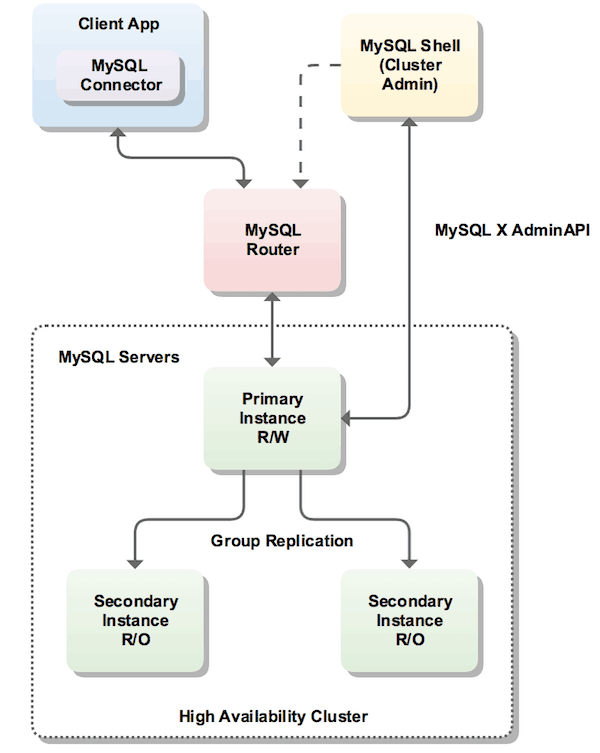Source: Wikipedia
A database has been a necessity for enterprises from the time immemorial. Especially after the enterprises have started moving their operations from offline to online platforms, the need for a highly robust and well-performing database is very significant. Enterprises often choose a database which they can rely upon, that would not cause any slowdowns and would provide easy access to the data.
For the enterprises choosing database makes it very important for their better operational performance which very much depends on the data access. Thereby, the database performance plays a vital role in the operations of your enterprise, which is why it is most often observed that database optimization is regularly practiced to keep up the high performance.
MySQL is one of the most used and likely recommended SQL enterprise database which is used to manage structured data by many enterprises globally. With its robust performance and constant evolution to match up the rapidly growing demands in the IT, MySQL has been successfully able to cater to the database requirements.
With the latest version MySQL 8.0, it has introduced some new features targeting to achieve better DB performance in enterprise database management at scale. In this article, we would explore what these new features introduced in MySQL 8.0 are and how would they affect the overall database performance. Also, in the end, we would discuss the possible way ahead and planning required for enhanced database optimization.
New Features introduced in MySQL 8.0
With the addition of these new features in MySQL 8.0, the main aim of improving database performance to optimize the operational performance of the enterprises has been successfully fulfilled to a major extent. Some of the foremost new features added in MySQL 8.0 are:
- Atomic DDL
MySQL 8.0, supports Atomic Data Definition Language (DDL) statements as a new feature. With Atomic DDL statement, data dictionary updates, storage engine operations, and binary log writes, that are associated with the DDL operations are combined into a single atomic transaction. This is due to the data dictionary which is now transactional in MySQL 8.0, unlike the previous versions where it was stored as metadata.

Source: MySQL 8.0 Reference Manual
An Atomic DDL ensures that the transactional changes are either implemented in the data dictionary, storage engine and binary log or rolls back, even in a case when the server halts amidst the operation.
This has enhanced the database performance with the crash-free DDL, where either all the updates to the Data Dictionary happens or gets rolled back, making it crash-free.
- InnoDB enhancements
MySQL 8.0 has also introduced InnoDB enhancements which are meant to improve the database performance. InnoDB is a general-purpose storage engine which offers high reliability and high performance both at the same time. It aims to protect the user data in maximum capacity by practicing transactions with commit, rollback, and crash-recovery capabilities.
It also ensures data integrity by supporting foreign key constraints, where the foreign keys updates, inserts, and deletes are checked to avoid any form inconsistencies or discrepancies in the data.
It has also helped in database optimization by optimizing queries that are based on the primary keys, by minimizing I/O for primary lookups with the help of clustered index which organizes the primary key data.
InnoDB has been successful in enhancing reliability in terms of rollback, crash-recovery options, and data integrity, at the same time, improving the database performance by making it crash-free and optimizing queries.
- User Role Management
To ensure enhanced security of the database, user role management is now supported with the MySQL 8.0. Now users can be assigned different roles which can be altered or revoked during the sessions of the user account. These roles define the access to the users helping DBAs to maintain the security of the database efficiently.
The way ahead
MySQL 8.0 has made some promising feature updates for improved database performance and to enhance database optimization. But to leverage the benefits of these new features added in MySQL 8.0, it is very important to know that only a diligent DBA with an apt understanding of Advanced MySQL 8.0 is required.

To keep up the high performance of the database it is important to persevere with the latest updates for the database optimization. As a DBA with a vast experience of over two decades, I have incorporated the exploratory strategies along with my co-authors in my book Advanced MySQL 8.0 to equip fellow DBAs for the way ahead.
As an enterprise, if you are looking forward to optimizing your database and require expert consultation, then feel free to contact me and I shall be happy to provide the right consultation required to enhance the performance of your enterprise database management system.
Eric Vanier
Database PerformanceTechnical Blog Writer - I love Data



